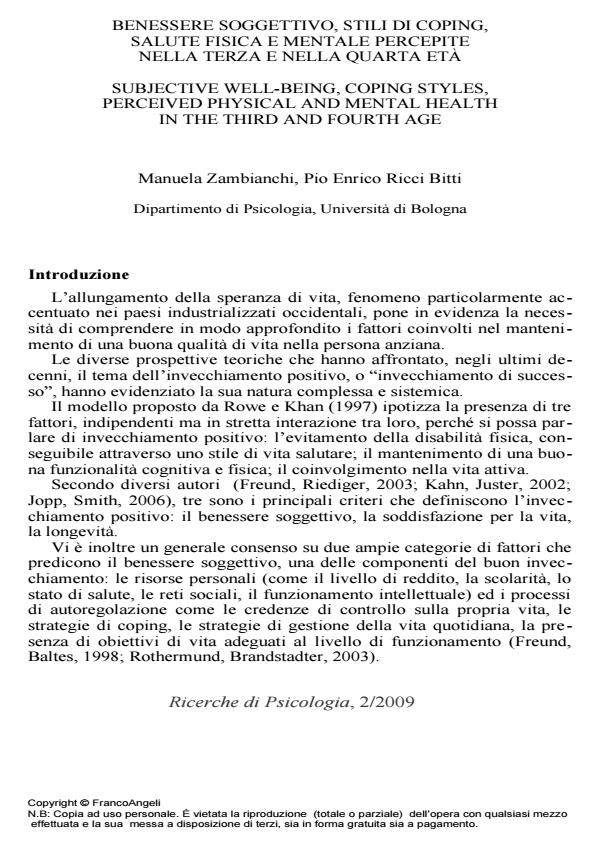Benessere soggettivo, stili di coping, salute fisica e mentale percepite nella terza e nella quarta età
Journal title RICERCHE DI PSICOLOGIA
Author/s Manuela Zambianchi, Bitti Pio Enrico Ricci
Publishing Year 2010 Issue 2009/2
Language Italian Pages 16 P. 135-150 File size 402 KB
DOI 10.3280/RIP2009-002007
DOI is like a bar code for intellectual property: to have more infomation
click here
Below, you can see the article first page
If you want to buy this article in PDF format, you can do it, following the instructions to buy download credits

FrancoAngeli is member of Publishers International Linking Association, Inc (PILA), a not-for-profit association which run the CrossRef service enabling links to and from online scholarly content.
The most influential theories about positive aging highlighted subjective wellbeing as one of the crucial factors that concurs to its realization (Rowe, Khan, 1987; Freund, Baltes, 2002; Gerstorf, Smith, Baltes, 2006). Ryff e Keyes (1995) defined psychological well-being as a multidimensional construct including six dimensions: Autonomy, Environmental Mastery, Personal Growth, Positive relations with others, Purpose in life, Self-acceptance. Our study has investigated the characteristics and the level of psychological well-being of the elderly, the relation between psychological well-being and the following variables: coping styles, subjective evaluation of mental health. the influence exerted by sociodemographic variables (age, sex, level of education, structure of family, urban or extra-urban residence) on well-being. 142 subjects took part in the study (mean age, 73 years, 55 males, 80 females, 107 of the third age, 28 of the fourth age). Psychological well-being was predicted by control coping style, perceived mental health, family’s structure, age. This results encourages future researches of individual and active variables that may influence the level of well-being of the elderly, and their interactions with psychosocial and contextual factors.
- Raccontare la transizione in casa di riposo: un intervento per il benessere dell'anziano istituzionalizzato Federica Biassoni, Stefania Balzarotti, Paola Iannello, in RICERCHE DI PSICOLOGIA 1/2018 pp.103
DOI: 10.3280/RIP2018-001008
Manuela Zambianchi, Bitti Pio Enrico Ricci, Benessere soggettivo, stili di coping, salute fisica e mentale percepite nella terza e nella quarta età in "RICERCHE DI PSICOLOGIA " 2/2009, pp 135-150, DOI: 10.3280/RIP2009-002007